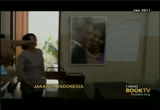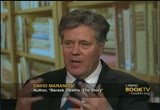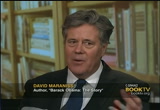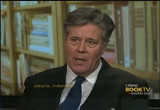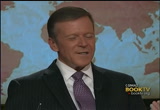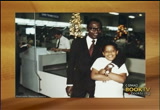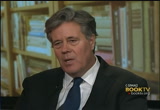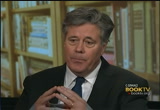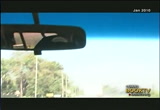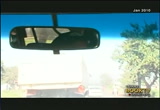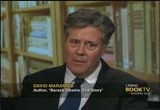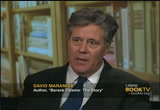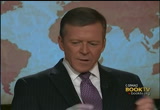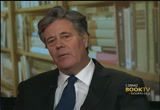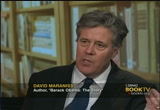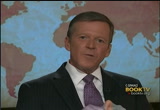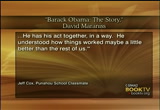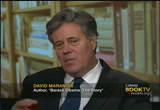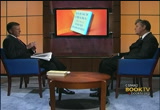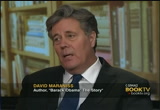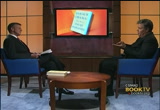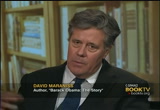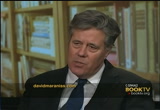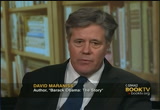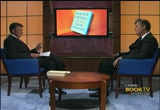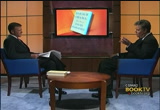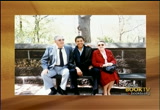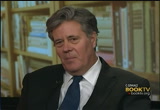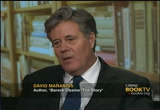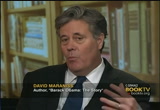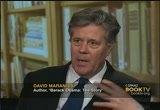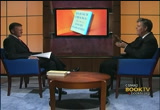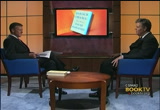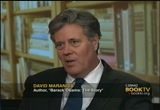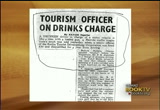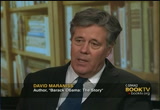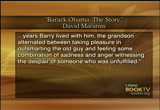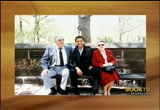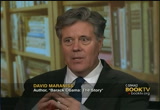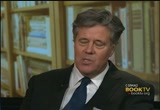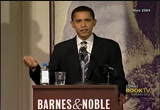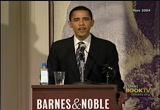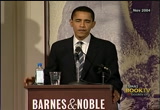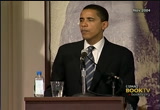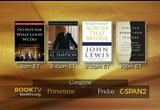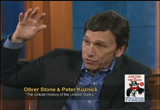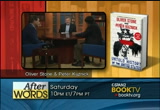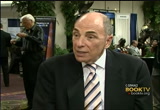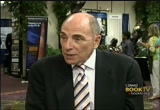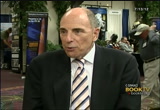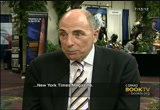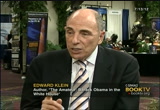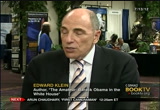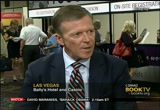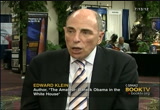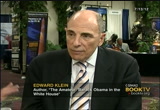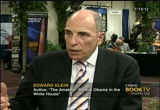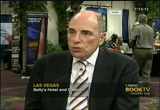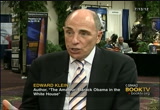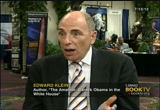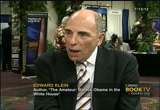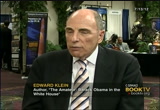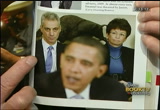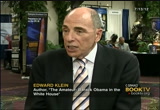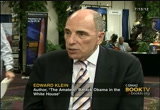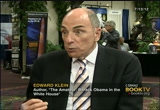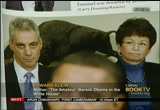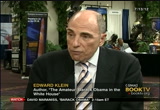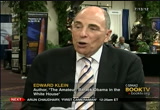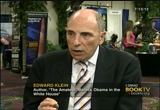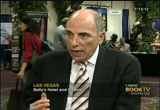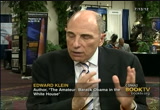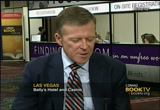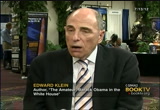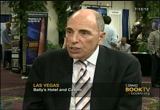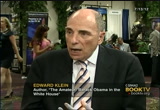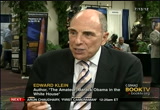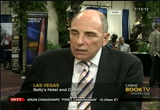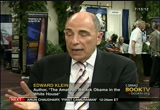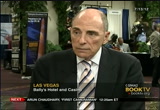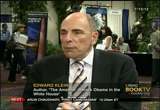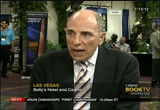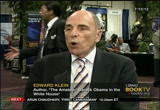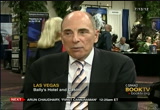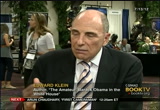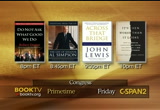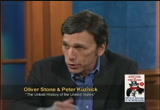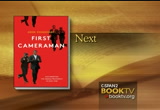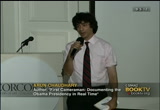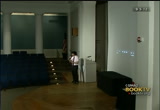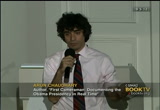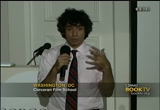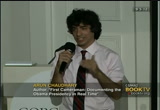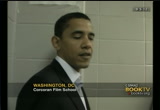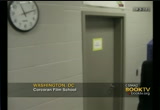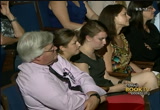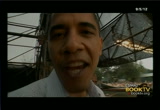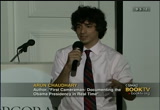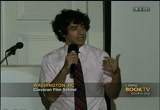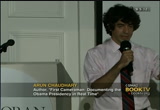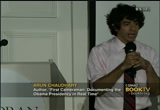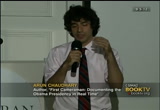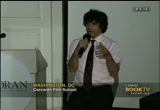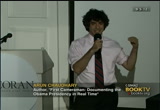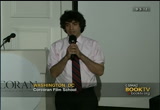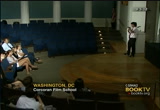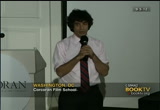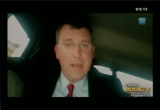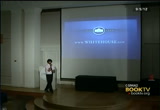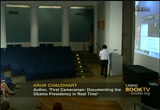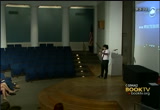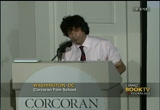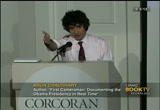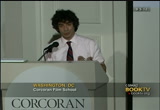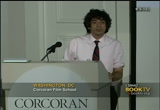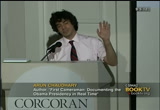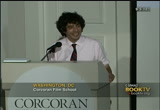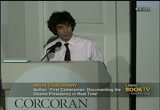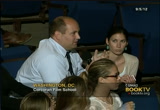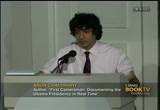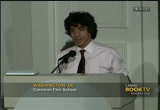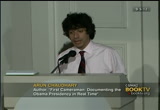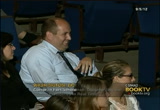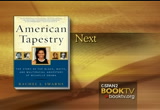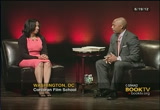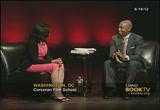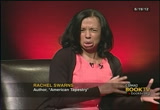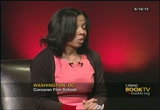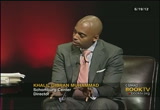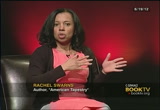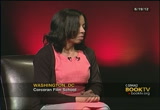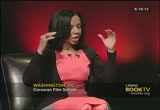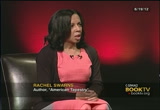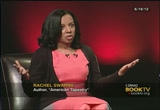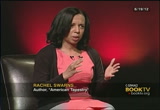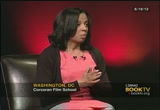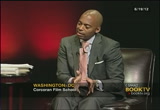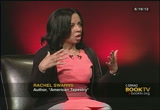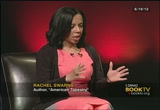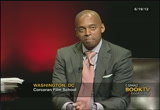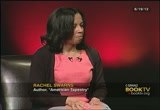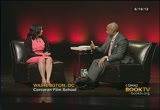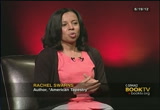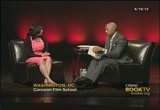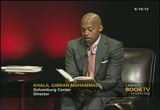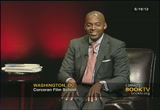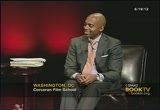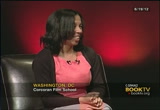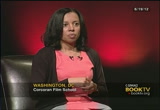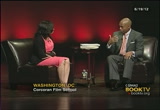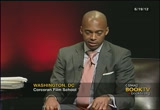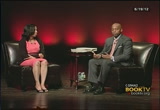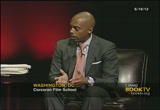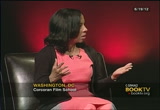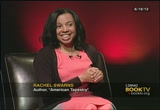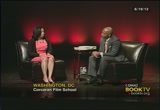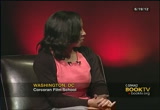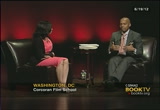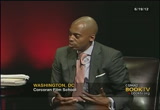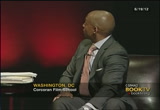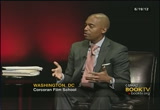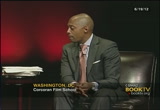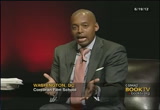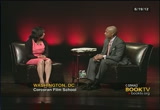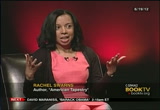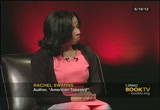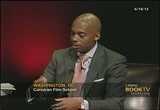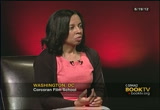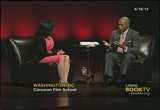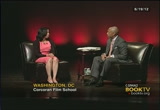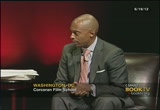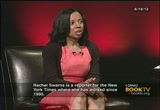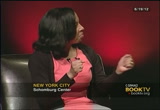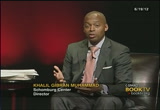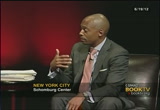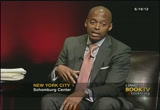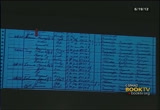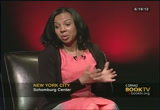tv Capital News Today CSPAN December 27, 2012 11:00pm-2:00am EST
11:01 pm
11:02 pm
there are people that were very upset. obama won in a landslide. but everywhere in the world, there is some controversy about any politician. so there are some questions about it. but not everyone understands. >> what was his lifelike in jakarta? >> guest: he is perfectly immersed. imagine a six-year-old child being immersed in the culture. sort of a lower middle class action. the exotic smells of jakarta. his father riding a motorbike to his job. his mother was there as well.
11:03 pm
that was his wife, life, he adapted. he had to adapt. but he did the best he could. >> host: why did he leave jakarta in 1971? >> guest: his mother couldn't afford to send them there. those 3.5 years, he is in indonesia, immersed in the language. the mother is waking up at 4:00 a.m. to teach him with english schoolbooks to supplement his learning. it is very difficult. and the whole process was something that she realized that she loved indonesia, she was still married, she wanted to stay. but it was coming to a point where she had to make a key decision. it turned out that he could get into the best elite private schools in honolulu, so he went
11:04 pm
back in fifth grade to start their. >> host: he lived with his grandparents in honolulu in an apartment? >> guest: yes, they moved to an apartment. it was five blocks from the school. he lived there from fifth grade through his senior year. >> host: from ages 11 to 18 years old? >> guest: yes, that is correct. there were some subtle changes. his mother to come back. she came back to study in graduate school. they live a couple blocks away for about two years. then she went back indonesia again. the bulk of that. maxima that's what happened. >> host: that was 1971 going to 1979 in honolulu? >> guest: yes. >> host: what was his lifelike? will kind of degrees did he get?
11:05 pm
>> guest: he was in indonesia and then his parents were separated and soon-to-be divorce but he was always very able to adapt. he was a fine student, but not a serious threat by any means. he was smart enough to get by with his grades without ever really applying himself to hard. he loves basketball. one time he saw his father was in honolulu when his father came back from three weeks and he came back and gave him a basketball for christmas. basketball was incredibly important to the young barack obama. that is an important theme in
11:06 pm
his adolescence and life. it connected to different parts of them. he came down to kansas to be the coach of some of the great figures in basketball history came out of kansas. even adolph rupp. he got his basketball genes from his family. his young black kid could still identify with african-americans in a way that he had not been living with his white grandparents. all of these other meetings were given to it, it was more than just something fun to play. that is really one of the central themes of his adolescence. >> host: you write in your book, david maraniss, "barack obama: the story", that he could not
11:07 pm
know that the luckiest thing that can happen to him is that his father had left. spearing his mother and him years of unpredictability and potential domestic violence. >> guest: well, i can write that. when you study it, it sounds speculative, but it's a difficult reality. it's a very big reality. and it grows out of what happened after. after they had that short time together, she became entranced by him. she called him by name. and she went back to kenya with him. and i interviewed her. i was the first to interview her. you know, all of these
11:08 pm
biographers come after me. but in any case, when i talk to reach baker, she told me stories about how abusive they could be. and that would've been when he and ann durham together. >> host: one in kenya, we talked about ruth baker, and i want to show a little piece of video. >> [inaudible] >> david, who was not?
11:09 pm
11:10 pm
[inaudible] [laughter] to that is a tough question. [inaudible] >> yes but that never happened. it is too hypothetical. >> guest: lisa helps me find ruth baker. in that interview, i will never forget sitting for several hours in corning her heart out. >> host: she married and divorced barack obama senior, but then she stayed in kenya?
11:11 pm
>> guest: yes, that's right. she had two children by barack obama senior. she stayed the whole time. she is still very much a part of nairobi in the community and runs a kindergarten there and has done so for several years. >> host: in 1964 to 1973, they were married. how long had she known him before she quit school? >> guest: she didn't quit, like, but she was teaching at that point. it was one of those very quick things, a couple of months, but she didn't know. and she said the reason he left cambridge is because he was kicked out. the harvard people have had enough of him with the drinking and the women. so they have been following very
11:12 pm
closely. i want to go back to one little thing. just because this is so troubling to me in any historian. there are documents that show barack obama senior in honolulu. there's no way he could have gone anywhere else and had that baby. he was in honolulu. anyway, so he was kicked out of harvard and went back to nairobi. so he went back. he called himself doctor from then on. he never got his phd. but she found him a few months later. found him in nairobi, not knowing what she was getting into. >> host: back to your book, "barack obama: the story", you write that what barack obama learned was devastating and disillusioning and a fallacy carefully constructed by his mother was shattered.
11:13 pm
his missing father was far from what he had been betrayed. not the wall man, not a freedom fighter, not a polished professional. brilliant, yes, but drinking and despair and disillusionment and disappointment. >> guest: is quite amazing to think about ann durham support of him and her support of him. and when she told him the story that she did. she never said a little word about his father, barack obama senior. i completely understand why she created this mythology about him. you know, year by year, he started to understand to some
11:14 pm
degree that the reality have to be different from what he had been told. but it wasn't until he got to kenya himself that he fully understood that. >> host: in the introduction, david maraniss, you write without dismissing the anger and confusion that he surely felt as he tried to short sort out his identity, he read to the root causes and a misunderstanding to his response to it. >> guest: this is not in any way diminishes the formation. but there's another thing involved. which is his search for identity it involves leaving and being left. his father left before he was
11:15 pm
conscious. his mother, even as much as she loves him, inculcated his life and was gone for most of his formative adolescent years. so all of that is universal in a sense that transcends race. the struggles that he had were not just about race. you can't look at his life and view it through racial lines. >> host: in about 15 minutes, we will begin taking your calls for david maraniss. he will publish his 10th book, "barack obama: the story." we are getting a preview of the book tonight on booktv. we will put up the phone numbers. if you'd like to dive in and start talking with our author, please go ahead and do so.
11:16 pm
numbers on the bottom of your screen. you can also send an e-mail. at booktv@c-span.org. or you can ask questions via twitter. twitter.com/booktv. of all began in 15 or 20 minutes when we take your calls. jeff cox was a classmate of the president at the high school. he said that iraq had the ability to project cool. almost a nonchalant way. it was all part of the image thing, not just of him, but generally in hawaii, where in my mind there was some kind of line between sophisticated detachment and just slacker lately. and he exuded the sophisticated detachment. he has his act together in a way. he understood how things work, maybe a little better than the rest of us. >> guest: you know, that was when he was 15 or 16 years old.
11:17 pm
and you can see some of those characteristics today in his presidency. there are a lot of reasons for that detachment. part of it has to do with hawaii. he was a native hawaiian and you just keep cool. no matter what else is going on. he had not come ridership with his buddies. best of all, you know, just being cool. it was part of his formative years. he has always had that nature. another aspect is more developed and related, i would say, or politics, which is in this country and all of its racial dynamics and explosiveness, a
11:18 pm
black person was discussed as being very cool. >> host: how much pot smoking did the president do? >> guest: well, there aren't are particulars. you know, the whole notion of bill clinton saying that he never inhaled -- well when jay leno asked the president about it, you know, without going overboard -- my book documented thoroughly. that is what they did. you know, they had a thing called total absorption, but not only did you inhale, but everything in the car as you were smoking it.
11:19 pm
there are few people there of african students, one of the african-americans and some others started calling him rocco, when i was with a ton of what's his name. with so many college students, they start to really go back and find their identities. that is what he is searching for. some people call him barry instead of barack. >> host: why did he choose occidental reign. >> guest: he chose it because there was a girl that he met in brentwood before that time. and so he wanted to go for that
11:20 pm
reason. occidental was like the next that. it was late in comfortable, a very bucolic, small and contained place. it was very comfortable. he really started to expand intellectually. i think he got his first defense of destiny during those two years. but he left because it was too much like his high school. he wanted to experience the world. he was still trying to find himself. from honolulu to los angeles and new york, but it was first important to get to new york first. >> host: he starts at columbia. his first night in new york city -- where did he spend a?
11:21 pm
>> guest: is very dubious about this in my book, but he -- he couldn't get into his apartment. he couldn't get the key of the sublet of the front of his mother's. so he slept outside of his suitcase. he said he had called and came over there the next morning. >> host: genevieve makes the scene in new york city. who is that? >> guest: genevieve cook is an australian who's mother had a second marriage to a notable american, so the family kind of had american ties.
11:22 pm
she came to new york city and met barack obama after he graduated columbia. they had a lot in common from the moment they met. they both had indonesian connections. the father and mother had lived in indonesia. he was a diplomat. and so she had lived there. her family was in the upper crust. and so she and barry both have this connection -- the indonesian connections as well.
11:23 pm
11:24 pm
eventually i found an article in "the new york times" about a lot of connections. obama writes about a new girlfriend. he is going up to her family's estate. this wealthy area in connecticut. >> host: at columbia university, a classmate of the president, to be honest, he had never had many black friends, he said. i saw that switch happened most
11:25 pm
markedly during the period that i was most close to him. barack obama was the most liberal person i ever met in terms of instructing his own identity. his achievement was really an achievement in the modern world. >> guest: beenu mahmood was one of a group of pakistani friends that barack obama had. they shared with him the he was comfortable that these guys.
11:26 pm
at columbia law school, they were very good guys. it is true that obama did his best. when i interview president obama in the oval office, he talked about the supporters in new york. but he started to make that transition in his long arc of his search for home. she was starting to happen and beenu mahmood was very perceptively seen that happen. >> host: why did the presidency president in new york after graduating from columbia? >> guest: he was trying to get a job wherever he could. he applied for a job in chicago after washington was elected mayor there. he didn't get anything. so the best he could do was stay
11:27 pm
in new york. he wouldn't want to go back to honolulu. he didn't have anyplace else. so he stayed there and as he put it, you try to make money for yourself and get a job. it is sort of a magazine or consulting firm called business international. for that year, he doesn't really like it there, but that is the period when they talk a lot. it is the period when he met genevieve. >> host: so david maraniss, going back to the quote, no life could have been the product of randomness like that of barack obama. chicago became a part of that randomness? >> guest: well, the mayoral election in chicago was very attracted to him.
11:28 pm
and chicago was the place to be at that time. oprah winfrey, michael jordan, the king of the bulls, oprah winfrey had her show, and barack obama who came anonymously. and he is arguably today's most influential. >> host: in chicago community organizer, you quote him. saying that obama was one of the most cautious people i ever met in my life. he was never willing to to take risks, vote a straight nomination of someone who would have to weigh everything to death, and then take a dramatic risk at the end. >> guest: that sounds like president obama, too. some ways that characteristic can be looked at as his life and career. but as a community organizer, the whole notion and method for
11:29 pm
community organizing was to take action, and you have to seize it. he was one of his mentors. barack obama was sort of a different sort. looking for ways to not confront in other ways. i can be >> host: while he was there as a community organizer, what was the president's life like? >> guest: he lived in hyde park. a great part of the city, it is notoriously known as a city in the united states.
11:30 pm
hyde park was a pocket of immigration. seems very comfortable there. he would spend every day, which was maybe mostly poor, and there would be a bubbling bridge area, rich in terms of personality, i mean. he really felt at home for the first time in his life. he was embraced by a group of older black women who sort of took him under their wing and loved him and created a sense that he never felt before. it was incredibly frustrating. not a lot during that time, he became a community organizer largely out of his mother's
11:31 pm
sensibility. you know, she was done organizing for women and artisans survive in a male-dominated culture. his mother was a little bit naïve in terms of the realities of the world. he started to see what power mac, how you get it, what he needed for real power, and that's what took him into politics. that is why my book ends there. because he's won everything. his father is home. you eventually see that he finds a special woman, and that is michele obama. and his self-identity and local
11:32 pm
power and he wants to go to harvard and come back to really get into that. >> host: in the interview they conducted on november 10, 2011, you quote him as saying that there is no doubt that what i retained of my politics with the sense that the only way i could ever have a sturdy sense of identity of who i was dependent on digging beneath the surface of people. the only way my life made sense is regardless of culture and race and religion, there is some commonality. the essential human truths and passions and hopes and moral precepts that are universal. >> guest: that is part of the speech that made him famous. the united states, not just red
11:33 pm
states and blue states. he presented himself as the personification of that notion. the presidency has been a rude awakening in terms of how far you can take that. so he could deal with the promise and frustrations of that idea ever since. as i'm sure we would both be experiencing in the telephone calls. >> host: so your book ends in 1989. he said there is another common? >> guest: i didn't want to get too ahead of myself, but i have every intention. i've done a lot of reporting through the years. i don't want to do a quickie. i don't write my books for the politics of the moment. >> host: the book ends in 1989. but at this point, barack obama,
11:34 pm
so far lived in seattle and 1962 until 1967, back to honolulu and then back to indonesia. 1967 to 1971, back to honolulu, 79 to 1981, los angeles and then he moved to new york for columbia come he lived there for years, 1981 until 1985. in chicago for the first time in 1985 until 1989. then off to harvard law school. two more pieces of the book i would like to ask you about. we want to tie the story together. now we are in 1989. where is his father? >> his father died in 1982 in a car accident driving home drunk from a makeshift bar area --
11:35 pm
when we were in nairobi, we saw the streets in the area where this took place in it was almost sadly inevitable. >> host: are his grandparents and mothers alive at this point? >> guest: yes, all three are alive. his mother died right before his book comes out. >> host: "dreams from my father" >> guest: yes, "dreams from my father." so she never got to see his political career at all.
11:36 pm
the grandmother was in many ways the study figure in his life. and she died a few days before he was elected president of the united states. >> host: two more quotes. by the time that barack obama reached chicago, the grandfather had retired after 20 years in the furniture business in another 20 selling insurance. it had ended his life's work, which he never liked and never did well. he was a smart man who had not come close to filling his potential. during the years that he lived with him, the grandson alternated between taking pleasure and outsmarting the guy and feelings become a nation of sadness and hurt her, witnessing the despair of someone who is unfulfilled and you also write that there was nothing publicly excessive about their grandmother who'd been and
11:37 pm
always will be a significant and underappreciated influence on barack obama, in particular in terms of personality and possibility of his life. they could not tolerate gossip behavior. she kept her own troubles for her struggle with alcoholism. >> guest: i should say, and i don't need to correct you, but it is pronounced a different way. so some people pronounce it one way and others pronounce it another. they were his grandparents. you know, i have done a lot of reporting about the grandmother. and what rock she was in the family. president obama acknowledged me during my interview with him -- and both of them are fascinating characters. you know, the grandfather
11:38 pm
without the tragic ending -- you know, he's got all of the big hopes. during the very moment when he said he went to california and joined stromberg was going to be a writer and he had all of these writings that he had done that is sort of the fantastic life and madeleine had these greater ambitions. her role model was bette davis gracia wanted to be sophisticated, and the moment she stood up, she wanted to have a great relationship. incredibly dependable. and she rose to the office of
11:39 pm
vice president at a bank in hawaii. president obama, when i interviewed him, described him as a madman, which i find really interesting. his grandmother went from being a secretary to a higher role. it wasn't always easy in that family. but he never felt unloved by either of them. he was really adored, even though he was troubled in other ways. and madeleine was always there for him, even though she was not a very emotional person. but she was the dependable
11:40 pm
pragmatic one. >> host: last hour and a half we have been talking with david maraniss. author of "barack obama: the story." this is his 10th book. it's your turn if you'd like to call in or e-mail. the numbers are up on the screen. booktv at c-span.org and twitter handle is twitter.com/booktv. we will begin taking those in just a few minutes. in your book, you reference dreams from my father quite a bit. here's a little bit for president obama in 2000 for talking about his autobiography. >> i just had an appearance on charlie rose that he was asking me how does the book connect with your politics. and it is very clear to me that there is a direct line between the subject matter that is contained in "dreams from my
11:41 pm
father" and the type of politics that i aspire to. because essentially what the story is about is a boy born to a father from kenya and a mother from kansas, and hawaii with an unusual name. who travels to indonesia, came back and found himself in chicago, working in some of the lowest income neighborhoods in the country. and then travel back to africa. somehow was able to weave together a workable meaning for his life as an african-american man in american and as somebody who is part of the broader human family. that was not an easy task. it wasn't an easy task not because i do not have some
11:42 pm
enormous love for my family. i certainly did. it wasn't because i didn't have people helping me every step of the way. i did. i had that help. but it was because i found myself born astride the nation and the world that is so often divided. divided along lines of race and class. divided along lines of religion. and so we have this enormous tragic history that all this confront, whatever our backgrounds are, whether we are white or black or hispanic or asian or muslim or jewish or christian. the notion that in fact, in the words of a great writer who happened to win a nobel prize, william faulkner said that the task is never dead and buried
11:43 pm
that isn't passed. i think all of us are constantly confronting our history. the history in this country, and the problems that arose in colonialism. we are confronting those scars of violence and oppression and struggle and difficulty and hope. not only on the larger canvas of history, but within our own families. for me, it was not entirely obvious how, in fact, i was going to be able to integrate them put together. all of those different strands in my life. so part of my challenge growing up was to figure out how i function as someone who is black, but also has white blood in me.
11:44 pm
how i function as somebody who is american and takes pride and understands and recognizes that i'm part of something larger than just the nation's. >> watch more online at booktv.org. david maraniss answers your questions for an additional hour. >> every weekend on booktv, 40 hours of nonfiction books. booktv in prime time on c-span2. coming up tomorrow night at 8:00 p.m. eastern, robert draper and his book about the workings of the house of representatives after republicans won a majority in 2010. then a book party for the autobiography of alan simpson.
11:45 pm
after that, congressman john lewis and the work of the civil rights activist in the 1960s. and thomas mann and norm ornstein on their book of partisanship in congress. >> the tension builds in one of the things that happens during that time is that a soviet submarine is found by american ships. and there are charges on a soviet submarine. a knock out the electrical system. the carbon dioxide is rising. people are passing out inside the submarine. they have no communication with the commander. the commander loads the torpedo,
11:46 pm
the war started already in the war is starting. they want to launch the nuclear torpedo. fortunately, one of the other commanders on the ship from a lower rank talked him out of it. it might have saved the world. >> of this is so close to the edge. it really was one of the scariest moments after this. >> they said we didn't notice. honestly, we were teenagers. my god, we wouldn't even be here to talk. >> director oliver stone and peter koznick of the untold history of united states senator nunn on 10:00 p.m. eastern on booktv's "after words." part of four days of nonfiction authors and books through new year's day on c-span2.
11:47 pm
>> at brookline on his book "the amateur." here's what he had to say. >> well, the book currently on your screen has spent several weeks on "the new york times" bestseller list. many weeks as number one. "the amateur" has been written by edward cline, who is our guest on booktv on c-span2. where did you get the title for this book. >> it came from a meeting that bill clinton had in chappaqua new york, north of york city where he has a home. this is back in august 2001. he invited several gas and it
11:48 pm
showed that he wanted to challenge the president and she is surprised by all this. and she said though, how can i do this, and the secretary of state. i have the ones with the miniver thursday. what about loyalty? and he said, there is no such word as loyalty in politics. he then went on to say that the people. the aaa credit rating of the united states, the barack obama was, in his words, an amateur. i spoke to people at that meeting. when i heard that, i said, that's the perfect title for this book, "the amateur."
11:49 pm
>> president clinton has denied publicly that he has used that term. >> i will tell you an interesting story. he has denied it, but hillary has told his friends that she suspected that of all people, chelsea had told me about this. now, that's not true. i've never met chelsea clinton. but apparently she has a reputation for that. this meeting did actually take place and that wasn't accurate representation of what went on during the meeting. we also talked about chelsea clinton's reaction. >> chelsea clinton felt that the democratic nomination is practically stolen from her mother, that she deserved to be the presidential candidate, not barack obama. and that the obama's had
11:50 pm
characterized her father, bill clinton has a racist during the campaign. [inaudible] >> aren't all presidents amateurs when it comes to office >> i think most are, but i don't think dwight eisenhower once. i don't think lyndon johnson was an amateur when he inherited the presidency after the assassination. i think he did not speak well to the teleprompter, but who understood how to manipulate levers of power in washington. he understood human nature. he understood the strengths and
11:51 pm
weaknesses of the people in congress and how to play on those weaknesses and strengths. obama doesn't seem to have that skill set to have human nature as a way of getting done and i think this is my 11th book. >> when you say to some of the critics? >> well, some of the criticisms about the accuracy of the stories they tell an executive. >> the fact of the matter is that as far as i know, there hasn't been a single fact that has been challenged in any kind of credible way. kids in school are, you know,
11:52 pm
they call each other names. when it comes to the credibility of my reporting, i don't think anyone has laid a glove on the yet enact how many years? >> 12 years of editor-in-chief in "the new york times" magazine. >> many of my books have been in vanity fair. it has one of the most rigorous fact checking departments in the magazine business. all of these books, not a single discrepancy has been found. >> you are interviewing jeremiah wright. what was that like? >> it was on the record and tape recorder. we sat down for three hours. we were sitting the way you and i were sitting.
11:53 pm
you know, it was an amazing experience none of that happening during our interview. he was very polite, very courteous, low-key, thinking in a modulated voice, quite intelligent to me. of course, i don't agree with a lot of the things that he was videotaped saying, but i must say that i believe the stories that he told me, many very interesting stories. >> where is he now as far as his relationship with president obama? >> he clearly feels bitterness that he was thrown under the bus by barack obama and the obama
11:54 pm
campaign during 2008. he felt that he had a special relationship with obama. went on for 23 years. barack obama only knew jeremiah wright through listening to sermons and sitting in a pew. in fact, barack obama and jeremiah wright had a one-on-one relationship in which literally hundreds of times in riverside's home, at every step of obama's career, he went to bed at night for advice and counsel and label directions. this is a relationship that was closer than any relationship in his life, with the possible exception of his relationship with his own wife, michelle obama. >> did he have any contact with
11:55 pm
president? >> no, there is no contract. after obama won the presidency, he sent him a note congratulating him on achieving his ambition, as he put it. he gave it to a neighbor of obama's. he didn't know whether to say whether that note was ever delivered. >> who is steve rogers, who you also interviewed? >> he is a professor at the kellogg school of management. at northwestern university. >> what was his connection with president obama? >> like many african-american businessmen and leaders, whom i interviewed, he was an early
11:56 pm
backer and supporter. he was primary to bobby rush in 2000. the former black panther corpsmen. he went around looking for people who donate money to his cause. steve rogers is a very successful businessman before he became a professor. he had $6000, i believe, to pay off some of his personal debt. in return, obama promised that he would visit steve rogers students. and if he won the u.s. senate seat, he did win the u.s. senate seat. rogers never heard from him, so he called him up and asked obama
11:57 pm
witty comment, and he said, i am too busy. i am getting phone calls from warren buffett and from steve jobs and bill gates in all of these important people. and he said, but you, it's. and obama said, well, you know, promises made by politicians, you don't believe us, do you? and he got very angry. and he demanded that we show it. eventually he did show up, obama did. but the point of the story is that some apolitical people that i've spoken to for this book told me similar stories in which they were there for him and obama and since they want, they want people, supporting him,
11:58 pm
organizing for him, contributing to him amah and that once he was elected, eventually to the presidency. it wasn't only african-americans. it was also jewish-american donors who gave him vast sums of money and never got their phone calls returned. it was oprah winfrey who worked hard for him and then was frozen out of the white house. caroline kennedy, on and on and on. the portrait that are derived from all of this -- here's a president and a man who felt that he deserved it was entitled to all the support and didn't know anything back in return. >> what about michelle obama. what is your role as far as
11:59 pm
she's concerned? >> i love that picture of her. she has been on the cover of many fashion magazines. the first lady but the world has been waiting for. she likes to show that she has no interest in politics, that she doesn't like politics and doesn't want to get involved in politics. that her main interest is in raising her children, taking care of her husband, doing some work, like her anti-obesity campaign. a very different profile of michelle obama, a woman who grew up in a household where her father was a political operative of the machine in chicago.
12:00 am
12:01 am
now know her. the michelle obama who loves being first lady. she is a very very intelligent, well-educated, well spoken woman with a great opinion and a strong opinion but who also has a reputation kerned for liking the very comfortable lifestyle and here in the white house she has people taking care of her every want and wish. she as you know has gone on many many vacations, some of them quite controversial to spain and the ski slopes in the western united states. she's been at one point during the period of several months, 42 days on vacation. she is living the life of a very pampered woman and apparently this fits with her personality.
12:02 am
>> you right, where's the clintons were open and above horrid about their co-presidency posting that hillary was an equal partner with bill, the obamas have been careful to hide the fact that michelle is the president's most important political adviser and the one he listens to above all others before he makes decisions. >> yes and i think that's so true. the way she does that is often through her very best friend, how she gets her opinions through. her very best friend, valerie jarrett. valerie jarrett is a woman who hired michelle many many years ago to work with her in mayor daley's administration in chicago. the more importantly valerie jarrett is the person who comes from a very well off african-american family with great connections to power sources all over chicago. when she introduced barack and
12:03 am
michelle obama to the power center, african-americans, well off businessmen, jewish american donors, daily political operatives and other sources of influence. as a result, she raised the obamas from really obscure the in chicago to a position in which they were now socializing and rubbing shoulders with the power centers, and it was these power centers that made it possible for obama to first become a united states senator and then the president of the united states. so they owe a great deal to valerie. she is their godmother. she is now the senior advisor to both the first lady and to the president of the united states and obama himself has said, i
12:04 am
run all my decisions through valerie and i trust her implicitly. there is no one short of the president in the first lady who has more power in the white house than valerie jarrett. >> you are so right there trying to figure out jared's mysteries hold on the president and first lady is a favorite guessing game in the parlors and dining rooms. >> it strange because what is your source of power? after all she doesn't have any foreign-policy experience but she attends national security council meetings. she's often in the most important domestic meetings regarding the economy. no one gets to see the president without first going through valerie jarrett so what is this power that she has. the only explanation i can come up with after all these interviews i did was that she
12:05 am
had given the first lady first lady and the president the impression that she had there back and she is protecting them from a hostile world if you will, a world in which people could come to see the president and make proposals that would not be to their liking. so for instance, when as an example, when the president wanted to do a mandate requiring religious institutions to provide free medical care, i'm sorry, health insurance for abortions and contraception, bill daily who was then the chief of staff, brad archbishop dolan from new york, the catholic archbishop who is now cardinal dolan, to speak to the president. valerie was obviously posted this mandate. when valerie jarrett heard about
12:06 am
it she went ballistic but bill bailey, the chief of staff had asked for permission to allow dolan to see the president. so suddenly her power and control was challenged. it was at that point that daley started to lose his power in the white house and eventually he realized he couldn't get things done. >> what is or was valerie jarrett's relationship with the rahm emanuel in the white house? >> not a good one. to this day rahm emanuel does not have good things to say about valerie jarrett. emanuel was opposed to the president -- and this is not only in my reporting but other people's reporting as well, the president going more broke on obamacare. he thought he should do incremental steps first, small steps, popular steps that could get republican backing for it. valerie jarrett and michelle
12:07 am
obama were the two people who said listen mr. president, actually valerie calls and barack. the only person in the white house other than michelle who does. you were elected to be not just president but to be a special president, a transformational president, a person who is going to change the direction and the course of america. you can't just dupe this piecemeal. you have to take the whole thing, go for the health care bill to go down in history as the first president to pass a national health care bill. he listens to valerie and michelle and not to rahm emanuel. this was the beginning of emanuel's erosion of power because it was one of several examples in which the president listened to the ideology of valerie jarrett rather than the
12:08 am
pragmatic good vice of rahm emanuel. ultimately, from emanuel was forced out of the white house by michelle and valerie jarrett into the stay he resents that. >> edward klein, what are your politics? are you conservative? >> i think i would describe myself as someone who is right of center. the if that makes me conservative, then i am a conservative. i'm certainly not a liberal. my training as a reporter is to let the facts speak for themselves but i do have a sense that this country has been drifting in the wrong direction and that it ought to be righted if you will, using that word right in the post-sense of the word. >> have your politics changed over the years? >> i think i have been a conservative or conservative
12:09 am
leaning for quite some time. i don't think they have gotten any more conservative. on some social issues i am actually quite libertarian and liberal. >> were you surprised by some of the findings in your book? >> i will tell you the thing that surprised me the most in this book. i expected in the many trips i took to chicago -- i've live in new york and i went to chicago several times. i expected to find, and this may be my own precedence, that african-americans would bite you know, unanimously tell me how much they loved barack obama because they are black and he is black and that is the way things they are. that is not what i found it all. what i found is among the leaders of the african-american community, not the -- but the leadership, people who are well-educated and people who have this disinterest, the people who are concerned about
12:10 am
the direction of the country in a larger sense, that to a man and a woman they were displeased and disillusioned with barack obama. they pointed out warren says that today, whereas the national average of unemployment is 8.2%, in the african-american community, it is 14.1% and in some cities like detroit, it's 18% and in some areas, especially among african-american youth, it could be 30 and 40%. so it's a depression in the african-american community, not a recession and they don't feel that barack obama has adequately addressed his economic policies and failed not only america as a whole but the african-american community in particular. >> from "the amateur" you right
12:11 am
by all accounts obama was elected to a job for which he has little relish. he doesn't find joy in being president. like richard nixon and jimmy carter he is an introvert and -- his own company to that of others. >> yes, it's a kind of an ironic that barack obama in public, when he makes public appearancappearanc s, comes across as a likeable, outgoing, up needs die. and we can see again and again that his likability quotient far out runs his polling numbers in job approval. so he is a liked person in public but that is his performance we are talking about as a public figure. in terms of his actual working in the governance, toward the governance of this country ,-com,-com ma again and again i learn from both republicans and
12:12 am
democrats that he doesn't have the skill set as lyndon johnson had for instance, how to manipulate the levers of power in washington or ronald reagan who would get get together at the end of the day with tip o'neill, the democratic speaker of the house, have a drink with him, reminisce, tell jokes and then start working out how to get a bill pass. barack obama doesn't seem to know how to do that. he in fact, in private, he's a very introverted ers and who doesn't reach out beyond the small group of chicago operatives whom he has brought with him to the white house. >> opera had tried to ignore the ominous change in tone coming from the obama transition team as barack obama is it not gration drew near oprah's calls to michelle went and returned. instead oprah heard from max devlin that newly appointed white house ceremonies
12:13 am
coordinator who told oprah that she needed to talk to him first about the interview. once more he said overhead to run her interview questions past stevens, a deputy speechwriter from prior approval. it was a pain as far as oprah was concerned and a high-ranking executive at harpo studios ,-com,-com ma oprah isn't a snob but doesn't like to put up with it. >> as a result of her role during the democratic primary, which played a pivotal, pivotal role in helping obama get the nomination and wresting it away from hillary clinton, that she was going to be an important adviser to barack obama and in fact after he was elected president, oprah and obama spoke of some great length about using her to advise him on his communication strategy, especially in terms of
12:14 am
television, which he of course knows a lot about. when michelle and valerie jarrett heard about this, they felt that this was a threat to their control over the access to the president. they didn't like that at all. so, when oprah offered to do an oprah winfrey show from the white house to launch michelle obama's d.c. campaign, michelle held a meeting in the east wing of the white house where the first lady has her office and said, i don't want some rich, woman being the emblem of my anti-obesity campaign. backup back to oprah and she found out about her. it. she was furious. she said michelle -- and this is what she told her staff and i interviewed her staff. michelle doesn't like rich people. michelle doesn't like people.
12:15 am
she doesn't want you waddling around the white house and then she washes her hands of the whole thing and has announced that she is not going to campaign in 2012 for barack obama. >> the roll it jesse jackson and barack obama's early political career? >> that's very unknown and i was very fortunate being able to find out about that. jesse jackson is still a highly-regarded figure in the african-african- american community in chicago and when obama started running for the u.s. senate, he was advised, go to jackson and get some help from jackson regarding foreign-policy issues, domestic policy issues, but even more important, his oratory needed some work and he thought that jesse could help them. jackson agreed to do so and
12:16 am
every saturday for a whole year, barack obama was invited to the push rainbow meeting that jackson held, where jackson worked with obama on his oratory and his delivery of speeches. he improved tremendous lay. guess what? since he was elected president, barack obama has not invited jesse jackson to the white house once. he is totally completely cutting himself up -- cutting himself off from jesse jackson. no one seems no exact ui except that it appears that there would be a -- the object of jackson being in the white house might give the signal to white voters that obama is and jackson's corner
12:17 am
politically. apparently obama doesn't want to do that. see you right, if karl rove was george w. bush's brain, then david axelrod is barack obama's home or. >> his what? >> his home or. >> that's a pretty good line that i wrote there. he is a pretty good homer. >> what do you mean by that? >> what i mean by that is david axelrod is a really and creator of personal stories for politicians. so when barack obama ran in 2008, he didn't have a record to run on because he hadn't done anything. what he did have to run on was his personal story. the son of an african, a black african and a white middle american mother, a man who saw
12:18 am
his identity and founded, who was raised by his saintly grandparents and so forth and so on. this was a story, an american story if you will, he could as homer was known for talking about taking a trip and during the trip, coming to some inner understanding of oneself. this was the story that david axelrod fashion for obama to run on. it's a brilliant story. the problem is in 2012 there is no such story. we have seen that story. we know that story. that's old. he can't run on that story again. and he doesn't have a record in his first four years of success with the economy. i don't think anybody would disagree with that. to run on either. he can point to certain liberal causes such as health care but we see in the polls, but that is not a popular thing to run on.
12:19 am
so what he has been running on, instead of david axelrod's epic, heroic story, is a negative campaign in 2012. negative campaigning has been to attack, attack and attack mitt romney for being capital, for being a plutocrat, for being rich, for being out of touch. all these things that they are accusing rightly or wrongly, mitt romney for. so it's a very negative campaign and a very unusual one for david axelrod to run on. >> you right, edward kline, that what isn't terribly true about our president is that the net -- most successfusuccessfu l ones grow in office. can the same be said of barack obama? has he learned from his mistakes? the answer to these questions will strike many of the readers
12:20 am
of this book all to clear and i can hear them chanting in unison, no, no, no. >> look at john f. kennedy who came to the oval office unprepared to be president and made any mistakes in the first year or more, including the bay of pigs and other mistakes that he made. it is now generally conceded that kennedy by the time he was assassinated had grown in office considerably and understood how to deal with the military, how to deal with congress, how to deal with conflicting advisers and so forth. i don't see this happening happening happening with barack obama. he has not brought in, despite the fact that he said he was going to have a team of rivals. other than hillary clinton, he is not brought in any rivals whatsoever. he has in fact hardly used his
12:21 am
cabinet at all and he has created the zazu are of like mind with him, very liberal group of stars, including a woman named samantha power, who is one of his chief foreign-policy or advisers -- policy advisers. i don't think he has changed or developed a deeper or a better understanding of how to deal for instance with the economy than he did from day one. >> finally edward klein, author of "the amateur," i wanted to ask you about the report on a meeting with the story that president obama held at the white house. >> a very interesting meeting. it took place when he was in office only five months and he invited nine liberal historians to have dinner with him and the family quarters. no conservative historians were invited.
12:22 am
during that dinner, he laid out for them early, early, early in his term in office, what he would accomplish and basically what he said is he wants to be a transformational president who would ring social equality, greater social equality to the united states by spreading the wealth around and he believed in a morgue corporatist system of the economy, meaning that a government and big corporations and big unions would decide who is going to win and who is not going to win. and he would take a lesson -- a less aggressive role abroad and what we now call lead from behind. a lot of these historians wondered how he was going to accomplish so much when he had two wars going on at that time in iraq and afghanistan. even lyndon johnson couldn't get
12:23 am
a lot of his domestic stuff pass when he had two wars going but obama's said well, i can do it because, he didn't say these words, because i'm special. it was a real insight into his character, which has a great deal of i would call over self-confidence, hubris and great pride in himself and in my view a sense that he doesn't really understand how the world works, which makes him an amateur. >> you report on that conversation that took place in the historians meeting and he said that he proposed a new term for his term in office and that was in a foundation. >> yes, and doris kearns goodwin who is one of the historians there said, i don't think that's a good idea mr. president to call it the new foundation, your administration. he said well why not? she said that sounds like a woman's girdle to me.
12:24 am
>> go to great lengths to talk about one of the historians at that table but then you went to dinner somewhere outside of new york are outside of the city, so you wouldn't be recognized. >> all these historians were sworn to secrecy. they were not supposed to report on what went on at this meeting. i am a very experienced reporter and i finally got one of them to agree to talk to me on the condition of anonymity. he or she, not going to say which it was, agreed to tell me what went on at this meeting as long as i didn't identify that person. and so, i disguised the person by not using his or her name but i can tell you that i ran this version of what i would -- the
12:25 am
person and i was told that is exactly what happened. >> we have been talking on booktv with edward klein, whose most recent book is "the amateur," barack obama in the white house published by regnery and the number one bestseller on "the new york times" bestseller list for several weeks. thank you mr. klein. >> thank you very much.
12:26 am
>> the united states discovers that our surveillance flights over there and then the tension builds and we have the quarantine and a blockade around cuba. one of the things that happened during that time is that the soviet submarine is found by american, by american ships and they start to drop missile charges, depth charges on the soviet submarine. it knocked out the electrical system. carbon dioxide was rising and people were passing out inside the simmering. they had no communications with the kremlin. the commander of the submarine said low the true pitas. let's attack. the world war probably started already up above and we are not going to be doing somersaults down here when the war starting. it launched a nuclear torpedo.
12:27 am
they said it ready to launch. fortunately one of the other commanders on the ship of the lower frank talked him out of it. he might've saved the world. >> this is so close to legend. it really was one of the serious moments in mankind. schlesinger said we didn't know this, we were teenagers but i'm just so grateful. that is why all this criticism of kennedy and all this quarterbacking but my god we wouldn't be here to talk. arun the 1 -- subwong recounts his tenure from to 2,092,011. >> coverage of president obama range from formal moments in
12:28 am
greeting world leaders at the ge 20 summit to the casual as the president through warm-up push-ups inside of busch stadium at the major league baseball all-star game. this is about 40 minutes. [applause] >> thank you. it's so nice to be here. the reason i started out, and is something i talk about in the acknowledgments of the book i wanted you guys have the full breadth of how lucky i was. my boss the photographer was like you should make a movie about apples and how they get to the oval office. that is what i gave her and everyone was okay with it. to get you an example and people were really open-minded. this wasn't the primary thing that i was doing. what i was doing mostly with documenting a candidate and president obama, backstage moments, his authentic self off-camera and in that capacity
12:29 am
i was able to be inside the bubble and document a lot of things that people normally don't get to see. before we dive into that i want to show you actually what that really means. doesn't necessarily mean funny things about the prime minister in the netherlands. there are some factual inaccuracies. this is like from my show a weekly wrap-up that details the president's activities that can see every friday morning at whitehouse.gov. yeah. actually that was an unfortunate week where he decided it was funny all week and i had to be like at some point it's going to get old. that was my job. i was the guy behind the camera hanging out backstage getting these moments of over normally unseen and it's important to realize that with any kind of
12:30 am
motion picture technology available, it's not a new thing. in fact there was a film that starred grover cleveland in 18 -- whenever that would have been an mckinley inauguration is on film. people have wanted to apply film to the presidency forever but we just reached a point in time in 2008 when technology was enough that one person rather than i would say from the 60's onward about three people could actually do this work. more importantly than that i think it's a personality meeting technology moment. for instance, in the 1960 election and talks about the television election of jfk and how telegenic he was and it's all true but it's not to say that television hadn't than any major important medium and had been used by several presidents before him but he have this unique temperament and a look that really spoke well to
12:31 am
television. you have a similar thing with the internet and barack obama and certainly other people have tried to what extent they could have been i think there is a reason why say will.i.am didn't make good music video about howard dean. it wouldn't quite be the same. and also at the very heart of it, this is sort of a dangerous proposition. it seems very fun and oh my god its punching the easter bunny but you have to remember when you plan this kind of thing in the presidency nothing you other film is a race. it's in the presidential records so every scrap of everything, if he's mad about something it's all in there. at the very heart of it, the very thing you have to understand is unless everyone from the senior visors down to the president himself were in anyway never said about this it would have been shut down. the simple fact is the question people ask me, is he really liked that? what they are asking is, is he the same on and off camera turns
12:32 am
out to be the case. this is just to the guy is and i think that's why it's really hard to throw him off or try to -- you see a lot of negative campaigning and a lot of character assassination on both sides and i think you see it not looking at the president and his numbers remaining so stubborn to be good because people have a good handle on him and they feel that he is an authentic person and a lot of that has to do with the fact that we present as much material of the president as we can and always did from the campaign all the way through. president bachmann should be elected would not have created -- and i'm not sure if president romney would be there. but i guess we will see. so you know, getting this stuff may be a function of personality and barack obama being perfect for this but actually putting out was a little tricky. i want to show you some big that
12:33 am
probably hasn't been seen that much but its backstage footage from a few days after the announcement tour starts. this is like 2007, february or something like that. i think there's a date on front of it so embarrassingly enough we will see when it is. it was the third maybe. this is from markedly the same guy other than the hair that you see and you sort of wonder what would change to have people want to release this stuff. let's just take a look. >> this is reggie. reggie played basketball and football and actually tried out for the dallas cowboys. >> and the packers. >> and the packers. he concluded that he was better off in a political career because, although this is a contact sport, you don't break bones in politics.
12:34 am
so reggie do you have something to say to the camera? >> this has been the great experience and politics, unlike sports, you have a longer career, you still have to listen to people yell at you and you still have to try to make everyone is happy as possible. >> play division iii football. >> played division iii football. he has a similar temperament to bill parcells. he is a little grumpy and you know, i mean that is who reggie is referring to when he talked about getting yelled at. >> i know every yelled. >> he actually keeps a good demeanor but there's an edge to him, you know? did you guys put this up? >> yeah. >> that is about 9:00 at night.
12:35 am
>> you know whining. it's actually pretty good philosophy. it sums up a lot. you could do worse than just living by the book loss of the, no whining. you know? >> give a warm ask a team welcome to our next president, senator barack obama. [applause] >> you have the situation of accumulating this footage where people are starting to notice. senior advisers all the way down and their member talking to john del cecato recently who is a political consultant and he was
12:36 am
saying that what had inspired him about this footage wasn't the stuff we have been shooting but senator obama had directed a camera birthday message to staffers because they weren't able to be on the trail and she should have a happy birthday. hopefully she did, i don't know but after seeing it was like this is so cool and so so up in a guy wonderfully could do videos like this but somehow incorporating that backstage element into more traditional political media so the hybrid of this plus the standard commercial ended up being like the austin caucus spot i believe is what it is rittenhouse. and we did tons of these because we liked it so much. >> are regretting now? >> the next president of the united states, barack obama. >> we have a chance to make history on january 3. be a part of it. make sure to show up to caucus. let's go change the world. hey!
12:37 am
[cheers and applause] shirt. >> the central premise when i think about this is given enough time on the camera any person who -- this is a great example. you will not be able to resist saying that to the girl. you are just programmed to do that. i'm going to make fun of your teachers so i think these things are real and they are very endearing and we kept it up to the campaign filming all of this stuff on the net and tried to maintain that in the white house but that is one thing started to get a little rough. on the campaign we have a lot of resources and a lot of technology famously celebrated but coming to the white house white house moving on to live windows 95 machines and i want from a staff of six to a staff of one which is six times less if you do the math. i don't know exactly. that is why was never commerce
12:38 am
secretary. i was then not able to envision envision -- so if you look at that first really showed you i was accumulating all of these awesome shots but i didn't have this kind of 30-second campaign commercial venue to put this material out in it so i started sitting on more and more material and not having any way to release it. that force me to examine what is it that i'm doing? what is interesting about it and what is useful and that is when i i decided there are some things you can only tell about a person from footage like this versus the other ways public officials speak. the. let's say a public officials have five ways to speak. they can have a speech, hold a press conference, they can do an interview or direct to camera which is just speaking to the camera. right down the hatch. there's the fifth way, sort of a casual voice and by having this extra voice that allows you to say the same thing you said in those other voices but another
12:39 am
time without getting the listener fatigue you get a saying one thing five times the same way. you can say the same thing five different ways and then you have a better chance of getting through. i talk about this in the book because at the end of the day of video is a horrible way to transmit information. i know we all feel like her history teacher let us watch the movies instead of making us read books but she didn't learn enough to pass the test about that air of history. you probably didn't learn more about 1492 then the year that columbus actually did land in america. i don't even know if that's verifiable. it's hard to take information to convey so you have all these different voices and i thought maybe there's a way to synthesize all those voices together and that was, ended up being western wake was a weekly backlog of things that would take normal event to normal speeches things caption already
12:40 am
in interweave these things through them. it was very successful in that it was a way for people to catch up on the news if they missed it but more importantly sorted to put things into context. what are the things you can only see from this? i think one is that presidents are not afforded a public voice to show what they are curious people in general. the main thing you can see and backstage footage is what does they president ask about? what is he curious about? what is the follow up on? i do not know president bush very well and he seems to have a lot of wonderful qualities but being curious is not one of them. being able to show this president is being intellectually adventurous and curious is one important thing in all shows -- also the breath.
12:41 am
is being able to walk into a room where there is a family that is grieving over the death of a loved one and then say hello to the teacher of the year and do the ice cream social thing on the south lawn and do the congressional picnic. everything is different and transitioning, emotional intelligence it takes from transition to a moment like that to another moment that may be from absolute tragedy to abs lands trying up is what makes a good person and a good president. i can see it in lots of people and for instance in talking about george w. bush, actually when i look at it through this context and think about the things i have thought about his presidency i feel a little ashamed that i judge that presidency not based on that. it had a lot to do and they were trying to run the country as best they could. i think they are doing a better job but the things i thought of, laziness or this or that, knows
12:42 am
this emotional transition and i concede in the footage now. that is something that i was able to do that the press wasn't able to do, show content. on the west wing episode where osama bin laden gets killed within the first three minutes, it's really anti-climactic eco-'s we went to nasa and we saw the space shuttle. the president awarded the medal of honor to someone living in someone dead so it rings in this president contracting with the military and vastly different ways, ordering a strike to kill osama bin laden and also going to the correspondence center in between, talking to veterans who are living in talking to the families of people who are dead and he even did a training thing that week so by putting all these things together you get a much more complete idea of what the presidency is like and i think that's useful for people and i think that they like it.
12:43 am
they are entertained and informed by its residual he. that being said, when they came out there was a lot of pushback from the press. what's the story without? i think that those concerns would be well-founded if people were watching my footage and an absolute vacuum which they shouldn't be. there's a press and also my footage and both of them worked well together because of these things like context. who covers the press? oftentimes the most interesting shot in the oval office when the press pool comes in, it's big but it's not that takes a 130 press guys committee gets a little crowded in there. i'm the only one who can go back and shoot the whole scene, the press guys and what they are doing. even as people hunger more for processes and we all love shows about specialize cops doing one thing. i think this has come along in the final lesson i learned which
12:44 am
is the most important is that you have to produce material regularly, not just when the material suggests itself to be good. this is important for government work because if you all of a sudden spring information people it doesn't seem right and i have a very good example of that. we are make in a special in the gulf coast oil spill and i was in oskaloosa mississippi and that is where noaa has their headquarters and we were looking at the efforts to clean up the spill and amazing stuff and then i met the fish never. the fish never is a guy whose job it is to put this thing on his head and smell of the fish has oil in it. the fish sniffer is a thousand times more acrid than a machine that does it we. amazing. we have a fish sniffer. is fantastic. i'm sure they had one train beforehand and i'm sure there is now but i wasn't going to put that in the movie. guess what, don't worry about the oil spill.
12:45 am
we have a fish sniffer. we have all guy that does that and it's not going to be a problem. no one is going to buy it so if noaa had a regular program called the awesome stuff we do by noaa and one episode was about the fish sniffer, then someone could reference that and be like know the fish never is a guy i saw and he's a nice man. you can't bring a fish sniffer out of nowhere. for me that was hugely important lesson. been the final lesson i learned i think is when you are doing filmmaking like this you have to stop being a filmmaker because being a filmmaker is to eyes want one more shot and to always want to be on the other side of the door. to beat yourself up when you don't and this is not a job where that worked. if the door in the oval office close and i wanted to go to the other side, my own private rule, just relax, don't be a spaz, be
12:46 am
calm. as i started to do that i also realized this fly on the wall thing wasn't really working for me. i was pretending i wasn't there, and yet i was with the hair in the camera and the whole mind. i really started to be my authentic self, hang out with the team feel like you are working with people so it became less of a process of documenting the bubble, the fly on the wall and the bubble and more part of the team that is working to do things and working to communicate those things effectively. it was a great honor and a great privilege and now, i'm going to show you in the book there is a great picture of the president, a tall fellow who you will see in a second and i, looking at a computer screen and i say this is the only time the president asked me if i would show him the movie and the reason he asked is because he had heard this movie had been rejected from the white
12:47 am
house web site. p. also heard that it was quote unquote the best and wanted to know why. oh yeah, that's the one. this was a series i did on a trip to -- can you pull that on quicktime? i made a bunch of them and it was direct to laptop recordings of people explaining their jobs. >> we are ready. >> this was national trip director marvin nicholson in beijing. >> we are ready. >> let me know when you're ready. seriously, ready any time. >> we are good to go. >> hey there. marvin nicholson white house tractor coming live from the back of a van in china. we are just coming back from the great wall of china where the president got a tour. he really had a good time. i've got to tell you great is an
12:48 am
understatement. that thing is amazing. it goes on forever. i've never been to asia before so this trip has been incredible. not a lot of free time to get out however a couple of nice breccia and i made it out to sample cheeseburgers. the next time you're in tokyo ordered a cheeseburger. you'll be pleasantly surprised. yesterday at a few minutes in the afternoon and i got this haircut. he did not speak english and i don't speak mandarin but take a look at that thing. incredible. a little shop next door, i bought a little something in case they haircut did not turn out to good. checks this thing out. it's a panda have. it doesn't get better than that. thanks for checking out whitehouse.gov. i we'll see you next time. >> got it can't say exactly when communications director -- but it was some point between the haircut in the panda.
12:49 am
i was told not only would it not go on but it would set the relationship back several decades and would i mind not releasing it? some people on the staff had a lot of concerns but i wanted you to know the full breadth so you could have a sliding scale of what's going on. the present punching the easter bunny, that's okay. the panda hat, a little bit north of okay so you have to write that line in between between entertainment and politics in documenting and craziness and somewhere between a panda hat and the easter bunny lay in my job. do you know what i want to show you? marvin was so upset that this one did not get put up that we tried again. we tried again on the way home. we will let the group vote.
12:50 am
>> good morning, marvin nicholson white house director from elmendorf air force base. air force one is outside taking on some fuel before a last leg home to washington d.c.. it's my second 500 this thursday. we crossed the dateline in the pacific and also its minus 1 degrees. we have had the craziest weather, rain in japan, hot and humid in singapore and snow at the great while. korea though, very nice. i better get going. thanks for tuning into whitehouse.gov. i'm signing off from alaska. let's go. >> the trip director on that one kenny thompson, he needed us to get on the plane. the plane was ready to leave and he was like i need one more tae, i need one more tae, we can do
12:51 am
it on the plane. it was not quite enough. and with that tragedy had like two opened up to questions if anyone has any. i think you are all supposed to use this microphone so i will get that one. >> the did i understand that you said that once you films for the day, you could not add it? you had to use everything. >> no, no i can't decide if i want to keep something for the archives are not. every time the camera went on and off again all that has to go to the presidential library for the archives. anything that was released with go through a normal process like in a still photograph to the press shop in the white house white house and in the release but we are talking about hardships and stuff, after a
12:52 am
long day say you were in a couple of countries and everyone lands, we might get to see something because it's only 9:00 in france. actually i'm going to go to my room so it's one more layer between myself. >> why don't you do it anymore? >> right. i have this toddler and i was running out of steam. i was not healthy anymore, not able to keep up with the lifestyle and then you know after bin laden knightknight, call it enlightened nights but after the night osama bin laden was killed by remember going back to see what i had gotten and you don't feel like that every day. this job deserves someone to tackle it every day like it's bin laden day. that was when i started reaching out to bring in hope paul who is here tonight who is the second additional white house videographer.
12:53 am
>> is there anyone else doing this job? >> right here, right in front of you. >> sorry. >> i can do it. [laughter] >> we know what happens to all of the white house material that ends up in the presidential libraries but what about the campaign? >> the campaign stop, real decision had to be made. it was the server with wheels on it i think in chicago in and had to go someplace and he came to washington and lived at the dnc and was sort of returned to obama for america when they read read -- reignited the campaign. is the stuff well maintained and are the files to locate and backed up? i don't actually think so. in the dust settles in this campaign we really do need to take a look at that stuff the cassette she will now there is a military and archival bureaucracy that is extraordinarily concerned about this. one of the first meetings i had was with the archive people.
12:54 am
i am the camera guy, nobody cares. these guys cared in a wanted to talk about it. is interesting in terms of what you do and don't put in. a photograph you put them all in there but they were asking me, you're going to put the raw footage and, what about finished movies and what about in between? the presidential records not just about photos. the idea is that work done at the behest and on behalf of the president should be able to be examined by people so if i decide to make one edit this is one thing and if it says another thing that is part of my working process and technically should be preserved. this is unwieldy as of now and we agreed we would just have the final product and the initial footage but actually made a folder of the project files just in case in the year 3000 they can check it out so we will see what happens with that. >> i was curious about the editing too. is much easier to say okay the still photo is good to go but
12:55 am
this one not so much. how often did you have to go back with a finished piece and they said change this because it takes more time and more work and how did she then develop a policy or sense on what would fly so you don't always have to reedit? >> is a freelance film guide you live in dread fear of your client in this case your client seems to be one important people. that being said they were intelligent with me doing my thing quote unquote and by the end of my first year during west wing week we were getting the approval process done because the need to happen really fast based on the script. and the president punches the easter bunny with a big question mark. is a violent? no, it's fun. there's a trust not just between me and the president but between me and the communications staff. if it is what happened put it up and it will be okay but there wasn't that kind of
12:56 am
back-and-forth about like hey may be the shot should come in, different order. there was sometimes though, that joke is not funny. i know you think that joke is funny but it's just not funny. >> do you said that you got to change her style to the fly on the wall and the part of the whole process in the community. do you see yourself being able to apply that are having to go back? >> i think also as adding more agency to myself than i have. i'm incapable of being a fly on the wall is what it is. we were watching him watching the -- and the person in the back as me while i'm holding the camera. i don't know how i can keep it that still for that long.
12:57 am
i'm just good at forgetting what i'm doing and continuing to film. i have this amazing footage of the president reacting to the news of my wife's pregnancy which i was not expecting to happen. i was rolling on him and reggie love who is a big mouse sometimes. hey mr. obama did you hear ron's wife is president which i had been planning on pulling out a different manner than that. he looked around and it was like mazel tov. i actually filmed the whole thing while talking to him and you could hear me talking extemporaneously but focusing. you develop that rhythm and you never stop. so yeah. another funny one, we were in westminster abbey and he was looking at thy signet and. he is an impressive guy and he was enumerating it and i
12:58 am
realized i was having a conversation with him about it. it is in the west wing, yeah is pretty impressive. it's like when people talk i just respond. is just a natural thing for me. that is why maybe i will never ever be a journalist. this guy knows a lot about movies so i'm concerned. he's going to be like, towering inferno who played the victim? >> you talked really about the five ways most people get their information across by videos. do you think that the backstage sword of you know, sort of casual things they talked about lends itself more to give a sense of credibility to the actual footage? i see that a lot when i catch myself, people using a marketing tool now. i'm like holy -- could you talk a little bit about that. you are filming an unguarded
12:59 am
moment. people really don't know -- is sort of like i don't want to say reality tv but you're around it. >> it's called that. >> people forget that the cameras actually own and it leads to these more credible moments. >> its matches in question and you know when this type of film a king and we are not going to go to heavy into this, was first developed in france in the 60's the first guy, gene larouche, is everybody knotting? he talks about the camera is a catalyst so there is a reality and you bring a camera in the broom and it that makes things happen even more because the camera gets people just up and excited. that turns out not to be the case when the person next to the president is the -- next to the cameras the president. people spaz out and they are very excited to see the
1:00 am
president people spontaneously sing sometimes. this is the truth. it was never the case that someone was like, if the guy with the camera wouldn't have been there, it's barack obama. the flipside of that was just as interesting, when do i not film in a lot of times that also didn't have to do with the president but had to do with who the president was talking to. cullen. ..
1:01 am
1:02 am
1:03 am
horrible. there is a rule when you make a movie and a comedy if the actor does not get the joke you cannot use it. never. if you do not get the joke it will not come across. if they don't see what you we're doing war be something else then you end up with a candidate like john kerry who is impressive who pretends to be the president instead of himself and is punished by the electorate. we will end on a partisan note. i like that. this was fun. think you. [applause]
1:04 am
[applause] >> good evening welcome to the schomburg center to have rachel and all of you here come on this summer evening is getting hot out there. brace yourself. we have a special treat to as you have read about the new book "american tapestry" we learn a lot about that only the first lady but also the
1:05 am
country. i am looking for to hearing more about the process of writing the book that ratio would like to share that animates something that we do not already know. to begin what the audience probably does not know, you had support, a community, a behind-the-scenes players starting with a genealogy genealogy, institutions, a fellowship. to talk about the genealogy of the book itself and how we arrived at the story. >> guest: i wrote the story october 2009 about the first lady's family with a colleague of mine. and that became the genesis of the book.
1:06 am
i am a journalist. this is a new experience for me. >> host: congratulations. [applause] >> guest: so i had a notion i will embark on a deep dive with the first lady family in american history. i knew i did not have that much time. i did get a lot of support. i did take two years to report, research, and write the book. several universities, a catholic university gave me a research assistant and office space which was critical with young children. the wilson center from
1:07 am
washington d.c. also provided me with space and support. of the of pochette helped me when i took longer than i thought but then ms. with experts in the field and i took the first lady's grandparents and as far back as i could. looking at very different periods. i reached out to to the best experts to point* me in the right direction. >> host: i want everyone to hear that it speaks to how important institutions are to support research and writing. that institutions like the schomburg center and the smithsonian.
1:08 am
>> guest: them also. they made a big difference they were all enormously helpful. >>. >> host: i want to make a shameless plug. [laughter] our senior research and writer who introduce us and the title of the book is fighting for america. will let you know, but also the audience know because it is in her bibliography. to talk about the structure of the book.unfolds in reversing begins with the arrival of all four sets of michelle obama is
1:09 am
grandparents'. tell us why you organize to the book that way. marketing decision which is the most compelling narrative? why start there? >> when i started to think about the structure of the book, it occurred to me we looked at the white ancestors and the family tree. with so many generations of people emerging from slavery. i thought we know where this story and is with michelle obama, the first african american first lady in the white house. but where did it begin? it is an orthodox. i did not know how well it
1:10 am
would work. i thought because there was so much silence over the generation, to peel back the layers with the bits and pieces, would give a sense of the reverberation of slavery over time. you would be drawn to the beginning. >> host: the most consistent theme of the book and the way you tell the story is it your way to ease "the reader" into the moment of a terrible moment unfolding the legacy beginning with the six sure old slave girl.
1:11 am
of course, there is the first lady but i also wonder if thomas jefferson and sally cummings the story of a founding father's relationship with his wife's cousin or enslaved mistress. if not would this have been a more difficult story to tell? how would it be harder to wrap our imagination around the deeply significant fact of humanity represented by the mixture of african and european?
1:12 am
>> guest: it was helpful that there is a framework people have in their head with this situation. for michelle thomas family, it was quite different. but the discussion is on going and was vital. >> host: you describe it as a part of history? >> guest: it is hard for people to talk about. batf for a young girl 14 or 16 being raped by someone in her owner's family people don't want to talk about or look at and with the
1:13 am
research was clear that extended to the whites and the blacks. sometimes people would rather look away. some conversations were interesting. even in the 21st century. we know the history but sitting side-by-side with the conversation was not always easy. one descendant of a slave owner said in the end they decided they did not want to be identified. i said mrs. obama said she knows that the slave owners runs through her veins and she said that we were of the
1:14 am
wrong side of history. it seems like a long time ago but it is not. >> host: in fact, you were able to work with to distant cousins. one is black and one is white fade did not know they were related but as a result of your research, they assisted. tell us about your relationship to each other and the book. >> guest: to have a contemporary narrative i thought what the book is about was the sweep of american history through one family with modern-day people grappling these two
1:15 am
women i was trying to find the white ancestors and we thought it was someone in the slave owner family. i search for as many descendants as i could and the son of dolphus. i went back and forth to see these women of the family. they were older who really wanted to know. even though they knew what they found out would not be easy. >> host: have they rejected the story or is a universal embrace? the shields a family being the lineage represented by the former slave owner.
1:16 am
>> guest: there were mixed feelings about the research. someone did nothing to do with it. some were intrigued to but not wanting to be public. some treated it as history. there were times i played into the conversation. i am a journalist, we are objective, but i remember thinking to interview i would say will they looked at me and wonder? i said does it make a difference? she said it does in a way. i think there are sides. there was a divide.
1:17 am
even today she felt she was on one side and i was on the other. >> host: i talk about the importance of african-american history that's our representative of the disinvestment of humanity, arts in favor of commerce, science, technolog y. but what you just said and the context within need for the untold stories is indicative of the historical literacy that's black history is the subject that
1:18 am
is most of known or erased from our collective consciousness. is that where literacy contributes to our future? the larger story is essential to your vision of the country we ought to live then. >> guest: i don't know. i thought about how reflective her family was of the american story. i wanted to to imbue with a history so people could see her family had front-row seats to the most important moments. slavery, a civil war, and
1:19 am
emancipation, migration, jim crow, a depression, and all the steps forward and back were reflected of who we are. >> host: did you think of it as a smaller project? not to put it in context the individuals of the family tree but it became a social history of rural and urban urban, a southern and northern sweeping, intimate. did that scale have been as a result of their research with pen to paper and fought this is much more than i
1:20 am
thought? >> guest: alloys had an idea her family was reflective but when you are in it, it becomes something else. as a practical matter when you dig back this is far you don't have the voices you need to bring the story to life. people say what about letters and journals? if people were barred from writing and reading those records geneticist and historical records do not capture as much. i knew i had to get extemporaneous characters to bring it to life. i do not think about leaving those stories of the people
1:21 am
of the time. >> host: you did a very good job. [laughter] one review did make light that you were heavy on the conditional tone. is that something you were conscious of? may don't know for sure but as a writer is evidence of your responsibility you cannot say with certainty. did you struggle? >> i did. there is a lot less than there was. [laughter] when you write a book it is different from writing a newspaper article. in almost every sentence we want to say specifically i
1:22 am
know this but i do not know that. and also there was a desire that i had to put yourself in this person's shoes to feel and imagine. there is a power with that. also a power with the not knowing. but it was both wanting to be careful what i could or could not say. >> host: the power of not knowing or say with certainty is reflective of what makes history, history.
1:23 am
there are very few statistics but that is what makes the process so exciting because there are spaces we have to imagine what happened. with a historian as opposed to someone who could only say things that were matched by a strict adherence to when you would find what you thought or what people said is not exactly what came to be. you think kono? my favorite instance was michelle obama is great grandmother had a step
1:24 am
farther and he was a remarkable man, ran away from slavery, a joint the army. remarkable. her great uncle told me pate lake because he lost the leg in the war. i went to the archives and found the military record and his pension with the medical file. he had two legs. [laughter] i thought what do i do with that? this is the kind of man who made you think that is possible. bigger than life of course, he would have lost his leg again though war. [laughter] >> host: as a source of
1:25 am
evidence there was a beautiful passage but hopefully the book matches the advanced copy that i have just to get you excited but how you discover things in certain records of what surprised you. >> how does a marriage, and done? sometimes with the slow unraveling with the countless tiny threads that combine to people together. as tiny as a pin prick that
1:26 am
will foster instead of healing. those words with the unbearable silence somehow over time the small intimacy the enmeshed husband and wife the conversation seemed to vanish. weather across a kitchen table grows so why is it seems impossible to bridge. what happens between the two is hard to decipher because of the historical record are somewhat contradictory and also feed the -- phoebe was keeping quiet about her troubles. that is beautiful. >> you discovered in one of the marriages i believe frazier leaves the
1:27 am
family, goes to war and what tests he say? >> frazier came from south carolina, the golden boy of his small town. and lands in the depression and could not find work and struggled. got married. to children. things fell apart. he left his family and unlisted and the paperwork reads marital status as separated with no dependents. and he had children. >> host: what did you feel like? that would be hard to share.
1:28 am
>> guest: it was hard to share. >> host: he ultimately went back home and joined the family as if he had never left. [laughter] his son told me he came back from rome were to years he took the boys out but then one day he was reading the newspaper like he never laughed and they never spoke of it. [laughter] >> host: mentioning chicago talk about all four sets of grandparents and what was so exciting about chicago? share with us about chicago.
1:29 am
[laughter] >> guest: you have no bias. [laughter] chicago is where it was all happening. it was the big city one of the most fascinating record sources was letters of migrants one of the journal's collected of people from the 1900's of people looking for places. the black newspaper played a role to encourage migration. people wrote looking for a place and one letter was looking for a place a black
1:30 am
man could be treated like a man. it was not segregated like the south. you could go to school and vote and make a living wage. there is a social and religious life. when michelle obama is ancestors got there she says she is a south side grow but it looks nothing like it did. her great-grandmother phoebe arrived 1908 when the sell side was predominantly white >> host: there is a renaissance story and i want to read your description given important it is it is
1:31 am
a mentioned, it once was described as the negro mecca. you describe the shot, go renaissance as it was the syncopated rhythms becoming the soundtrack of the burgeoning south side. handy with the drums and there was no better place to be in the 1920's than chicago, the epicenter of the nation's blues and jazz recording industry. >> guest: that was lovely writing about chicago in that time is how many live in areas where there. langston hughes was wondering to chicago. louis armstrong. a lot of important people. >> host: just to affirm. [laughter] langston hughes this
1:32 am
auditorium is named for langston hughes and as he spent many, many years here doing research and contributing original pieces of work to our collection. we have benefited from his legacy. chicago has a dark side and we can illustrate a little bit of that. with this history what makes it hard is the racial violence and sexual abuse abuse, ford and backward of americans from slavery and it turns out chicago was not so different and i want to sink out loud of southern
1:33 am
exceptional as some. the way with which we remembers to the past through them memories of jim crow. even today of what racism really is and what it is about to come everything below the mason-dixon line. not new york. if you lived in tomorrow night what, elsewhere in the heartland you may think there is not part of the story. part of the chicago race right it use see a young black man who has been
1:34 am
stoned to death after a 13 year-old boy has been murdered at a beach because he swam across the cochlea's color line. african-americans ended up homeless. but you describe the idyllic racially integrated hyde park now the home of the first family. bombs going off two years before? what is going on? >> guest: it is fascinating because phoebe phoebe, her great-grandmother lived in hyde park. that is a big deal. somebody recommended to me the chicago commission study of the race riot when i discovered the bombings to african-american moving into hyde park there was a
1:35 am
campaign to move them out realized my goodness. >> it was not parlor conversation but propaganda. remarkable. i cannot remember how many that began before and continued after. it was a striking time. talking to her relatives i learned phoebe had to talk to cut there. the violence was sweeping the city she was by herself her husband traveled she got a pot full of water and lye
1:36 am
and a boil that on the stove and said she was ready. it was interesting to be placed there to feel her there. >> host: by the time you get to the reconstruction reconstruction, anything is possible. one "new york times" reviewer said of machel's ancestors were all playing people who've had no writings or left no property. abandonment, death, poverty and illiteracy and it the vocational sweet story of letting this. is that entirely correct?
1:37 am
>> guest: i would not say that. i think one of michelle obama says ant said it best, how did they get by? the american dream was to dream a little at a time. they got married. that was wonderful to read about the period of time after slavery ended when michelle obama great great great grandmother and grandfather lined up with scores of others to have the marriage legalized. there are so many things that were meaningful. it was hard that they seized
1:38 am
what they could and move forward. >> host: business owners, property owners and a college president. [laughter] part of that is true. >> guest: all of what he describes is true but there is more. i did not come away feeling worn down. i found it inspiring what people made of their lives despite everything. >> host: it struck me by reducing the complexity with a passage like fat, it gives
1:39 am
the impression this is the usual story in this struggle and strife and passing moments but doom and gloom. and prating about terrible things of the past, i thought what made your story rich and developing we could seize the complexities and did that have to read a textbook version. we knew their parents and children. howard johnson's sticks out more with the complexity rather than what is conveyed. it makes you wonder that we reduce the complexity is a
1:40 am
product of our lack of knowledge that we cannot appreciate the complexity. >> guest: things are rarely black and white to. no pun intended. there are things we don't know. part of our day to day life. i wanted do capture that to tell a story that was historical but human. these people are very human and with their life. i did not want it to be simple or easy.
1:41 am
1:42 am
first generation and he does amazing things out of his opportunity but there is a lot that is not clear. we cannot look back to see white supremacy is always there and defining and limiting but there are? that dolphus can exploit. you describe him as a ladies' man. strikingly handsome. piercing brown eyes. olive skin and irrepressible sense of confidence. most were sharecroppers, a former slaves and scramble
1:43 am
then the red clay fields the promise had withered like the spring grass seared by the summer sun. even his father who gave him that lighter skin never giving him legitimacy. t2 was born a slave and the man who's a identity he may have never known. he moves to birmingham alabama. but ultimately to provide the raw materials for the automobile industry, the manufacturing industry, and i take the liberty with the
1:44 am
pulitzer prize-winning book but there's an awful history that is an iconic place for the civil rights struggle. what can dolphus do in birmingham? >> guest: he did not want to be a farmer or sharecropper. this was not segregated. reef being given as representatives but. >> it was not uncommon but someone who wanted to make his mark could do that. he buys property. >> host: so he is an
1:45 am
amazing character. and is the most distant relative with this story but also people know him and how you could write about the life of melvenia. >> guest: a woman who was born into slavery 1844. to people knew her witch's remarkable. she lived an extraordinarily long life dying around 1938 these people lived long
1:46 am
lives but both of them have died since i interviewed them. i will go meet them and what will i find? that is what research is like. they were great except they were teenagers at the time when she was in her 90s. the things i was dying tonight in asia -- and i was dying to know is not what they were interested. but in her town of kingston separated by 20 years they have a complicated relationship. and talking about who the father is of these very
1:47 am
1:48 am
people of that generation clear lead dolphus had a direct connection to because we can look not right now in the audience the rainbow of color. but something happens wear the rainbow does not matter it is just california flitted the that the racial radar was more sensitive to the nuance that the futures demonstrated. do you think they are more sophisticated the way we assign moral value? >> guest: i did ask myself
1:49 am
whether or not if people had assumed that part of the reason they did not ask because if you were looking at someone you might have had an idea what had happened. we are in it period immigration, and it increased interracial marriage. we think of that period but then there were one point* 1 million people. the census had 5 million
1:50 am
categories. >> host: to talk about dna work works with 13 percent could be called mixed-race that here we are at the end of the 21st century but still attached to a whole category of humanity based on the definition of a white person. that means how we support the country that we lived in. public programs programs, education, criminal justice system. we pass judgment and organizes life over simple
1:51 am
by very calculations. a criminal justice system that is too comfortable targeting young black men regardless of the rainbow of color. there is a fluidity. i read that the whites could see somebody like dolphus share of that lineage. i want to finish that you describe the onset of jim crow and made me think of reconstructionist period that we don't talk enough about this tremendous achievement for the first
1:52 am
generation of people. you describe the tens of thousands of people are disenfranchised but two decades before 1500 african americans serving at local, state, federal offices. it is a powerful period to look at tremendous opportunity and promise and then so much changes so quickly. but how fragile is progress? >> guest: when i was at the newbury i was looking for michelle obama is voting records if i could find out who was the first person to
1:53 am
vote? it was hopeless but i stumbled across a book that had voter registrations from 1860's from north carolina. i thought my father is from north carolina. fair he was. my great great great grandfather, 186740 years old, registered to vote. he was approved. i don't know if he did or not. we no later that those people seizing hold of democracy would end for him
1:54 am
but that was something at that moment. >> host: it reminds us the way you tell a story that whenever the first family represents moving past the racial divide of the 20th century, there are huge differences based on experience being black in america and a perception. but one of the most powerful lessons in is if you believe there is progress then protected. it does show us how fragile with the challenges of
1:55 am
racial violence, or the demise of political power and participation with the emergence of jim crow. that we should be vigilant about whatever gains we made >> guest: it inspired me where they could, they were striving. i said to much about striving. said the book review. [laughter] but they took the space and did the best they could. that is meaningful. >> host: the second point* you mentioned your fellowship so we have a slide.
1:56 am
mary is born 1835 these are the distant cousins instrumental to connect the family dog. these are little michele on the left and her brother on the right to. this character does not appear in your book is a contemporary. they were born roughly one year apart. a mississippi farmer noted in the 1870 census as 35
1:57 am
years old, part with a woman named betty. they had the child named henry. so on the census record from mississippi the last name is at the top then you see robert 34 then you come down to betty she is 31 she is from virginia. is not so easy but therein is henry. fair henry shows up in the 1900 census now he is 32 years old, followed down
1:58 am
159 Views
IN COLLECTIONS
CSPAN2 Television Archive
Television Archive  Television Archive News Search Service
Television Archive News Search Service 
Uploaded by TV Archive on

 Live Music Archive
Live Music Archive Librivox Free Audio
Librivox Free Audio Metropolitan Museum
Metropolitan Museum Cleveland Museum of Art
Cleveland Museum of Art Internet Arcade
Internet Arcade Console Living Room
Console Living Room Books to Borrow
Books to Borrow Open Library
Open Library TV News
TV News Understanding 9/11
Understanding 9/11
